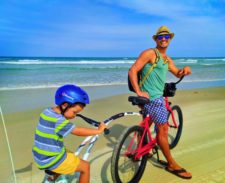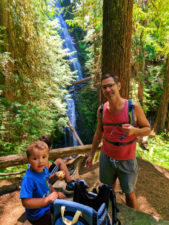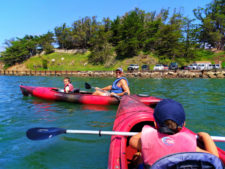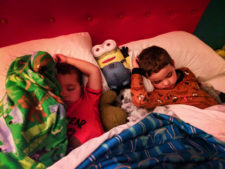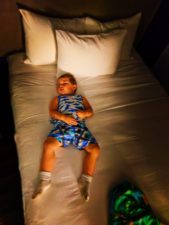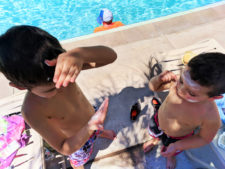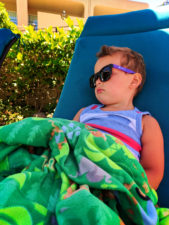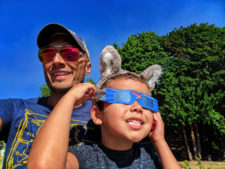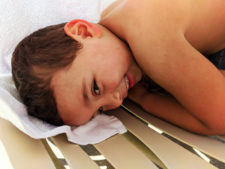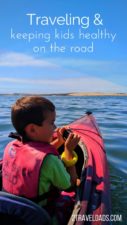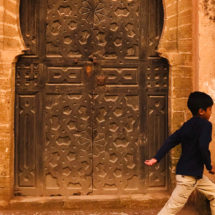We share a lot about staying healthy while traveling and keeping the kids’s learning wherever we are, and that’s because we know how important it is and because we love to give out free advice. 😉 Well here’s another helping of advice that’s extremely useful, both for parents and for those who might have to watch over somebody else’s kids at home or on the road. Keeping kids healthy involves everything from ensuring they have proper nutrition to maintaining a clean home environment.
As part of our partnership with Know Your OTCs, we’re sharing our top five tips for keeping kids healthy, particularly when traveling. Also, take note of some of the retro advice that we call out, as it’s nice to check what you know vs what’s actually doctor recommended.
Top Tips for Keeping Kids Healthy While Traveling
To get it started, take a sec to watch this fun video we were a part of for sharing tips and recommendations for ensure kids stay healthy and safe in the sun and more.
Tip 1: physical activity does a world of good
It doesn’t take much to make your body feel better when you wake up a bit sore or when you think you’ve been sitting too long on an airplane. Physical activity gets the blood moving and helps your body recover by moving vitamins and nutrients where it’s needed. The same goes for kids’ bodies. Keeping kids healthy while traveling starts with keeping them moving.
In addition to the benefit of good circulation, keeping kids physically active teaches them good, healthy habits that will sustain them and keep them physically fit all life long. This doesn’t mean that you take your nephews on a trip with you and then figure out where they can do Cross-fit for Kids, but it’s ensuring that when you’re the adult in charge that you don’t just plop the kids in front of a screen. They’ll have their whole live for that.
Easy activities to keep kids healthy and active when traveling
Plan time outside – going for walks or to the park is easy, doesn’t cost anything and can happen nearly anywhere. We love visiting National Parks and historic places.
Go for a hike – you don’t have to climb Kilimanjaro with kids to teach them the value of a nice hike; mild, easy hikes are great to inspire future hiking habits. Check out great Washington state hikes with kids.
Biking – most kids love it and most destinations have cheap and easy bike rental options; if a child is too small for biking or doesn’t know how yet, child carriers and double bikes are often available. We love biking in the Golden Isles of Georgia or Seattle.
Paddling – watch for Groupons and other travel deals for where you’re heading to score inexpensive kayak rentals that are great exercise for any age. Kayaking in Florida and around Washington is fun and available nearly everywhere.
Tip 2: proper sleep has big benefits
Whenever we travel without our kids we always are sure to give clear but flexible instructions around sleeping schedules. We know what they need and how they behave when we through their regular sleep times out the window, so communicating that with whomever is watching over the kids is very important. Example: kids go to auntie’s how for the weekend and stay up until 10pm and the youngest skips naps, two days after we’re all together again we still have cranky kids, worn out kids susceptible to getting sick more easily.
Retro advice: kids don’t need naps after they’re two or three.
Actual advice: you know your kids’ needs and what they can handle and still remain healthy and human; share those needs with their caregiver or if you’re traveling with your kids, keep in mind what you know is good for them. If you know your kids need naps or just downtime in general to stay happy and healthy, build that into your travel schedule.
Tip 3: sunscreen even on the gray days
Traveling or at home, sunscreen is something we often use for keeping kids healthy. We know that there is a lot of value to getting sunshine, particularly in teaching young bodies how to produce Vitamin D, but we also know that too much sun exposure can both cause sunburns and make kids physically ill.
We are careful about using sunblock with the kids in a few different ways.
- We want our kids to be protected from sunburns, particularly when we travel to tropical locations where the sun is extra intense
- We only use reef-safe/fish safe sunblocks because we need to be thoughtful about the impact we have on the world
- We apply sunscreen on warm gray days too; overcast skies sometimes produce some of the most intense and unexpected sunburns.
- We don’t use TOO MUCH sunblock on the kids or TOO HARSH of products; they still need to get sun for healthy Vitamin D production and we don’t want to coat our children in chemicals. No thank you.
We’re not doctors, so we’re going to refer you to your own pediatrician for advice around how much time in the sun is good for keeping kids healthy. Like with anything, researching on the internet can be helpful, but when you have a live resource who you know and trust, like a family doctor, they can be the most help.
Retro advice: block that sun; lather kids up and don’t let them get too tan.
Actual advice: using a gentle, environmentally responsible sunblock in moderation helps to protect kids’ skin as well as allow them to benefit from natural sunlight.
Tip 4: follow instructions for medications and remedies
Most kids don’t need to be taking medications on the regular, but there are times when a cold or allergies sneak up on them and you choose to give them a remedy or over-the-counter drug (OTC), or even if they become ill and the doctor prescribes something for them and you’ve been instructed to see the medication through to completion. Whenever you are using a medication or remedy, with yourself or your children, always follow the dosing instructions provided. And this may seem odd to call out, but use the measurement tool provided with children’s medications. You don’t want to just eye it when you’re giving your child something to help them feel better.
Retro advice: using a kitchen spoon is fine for dosing cough syrup and such.
Actual advice: pay attention to the clearly written dosage on any medication or remedy and use the tool provided; some are listed in mililiters (mL) and some in ounces (oz).
And don’t be afraid to remind the babysitter or grandparent of this too. Even though it is logical to follow instructions, some people have their own ideas of what works. FYI, this goes for vitamins too. FYI, gummy vitamins aren’t a treat and they DO HAVE dosing instructions to make sure kids don’t get too much and become ill.
Tip 5: good hygiene has lasting effects
Keeping kids healthy is as easy as good hygiene. We travel a ton, A TON, with the kids and whenever we’re in airports, train stations, theme parks, National Parks, restaurants, ferry terminals, elevators, forts, museums… we always make certain that they’re washing their hands and not touching their faces. This goes back to our article on flu prevention while traveling. Keeping clean keeps kids healthy.
This also goes for teaching young kids to be sanitary/hygienic. This one falls more to parents or primary caregivers than to babysitters or the random friend who watches your kids for the night so you can have a nice dinner in a new city (always do that). Teaching kids to mind their bums and wash themselves well when bathing is very important. We’ve all known or been around the stinky kid in school and often it came down to them not bathing well or wearing clean clothes, and sadly that kid was probably made fun of and didn’t have a good sense of self esteem or positivity. Outfit your kids with the skills to take care of themselves personally and they’ll grow up to be healthy, happy, confident individuals who in turn will raise their own little healthy kids.
Retro advice: kids will be kids and they’ll make fun of other kids for one thing if it’s not another.
Actual advice: teach your kids self-care and how to be a part of society so they can have a positive impact on others, starting with teaching them to take pride in themselves. It’s true that you can’t control other children and how they might hurt your own kids’ feelings, but setting your children up for success as best as possible is a step toward keeping kids healthy into adulthood, both mentally and physically.
Whether you’re taking care of your own or watching over somebody else’s children, keeping kids healthy is easy and shows them just how much you care and love them. The tips above apply to traveling with kids just as much as being home with them or leaving them with a trusted friend or family member. Being active, getting sleep, being mindful of the sun, using medications as directed, and proper hygiene are simple and effective ways to keep kids healthy (and yourself too!).
Want to pin this for later when you need to leave your kids with a sitter, or when you know you’ll be watching somebody else’s children? Go for it! Parenting and childcare is hard enough, so good and simple advice can go a long way in making it easier. 🙂


